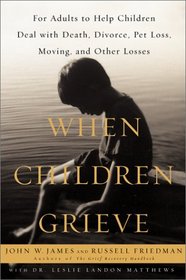Search -
When Children Grieve : For Adults to Help Children Deal With Death, Divorce, Pet Loss, Moving, and Other Losses
When Children Grieve For Adults to Help Children Deal With Death Divorce Pet Loss Moving and Other Losses
Author:
To watch a child grieve and not know what to do is one of the most difficult experiences for parents, teachers, and caregivers. And yet, there are guidelines for helping children develop a lifelong, healthy response to loss.In When children Grieve, John W James and Russell Friedman of the Grief Recovery Institute, along with psychotherapist Dr. ... more »
Author:
To watch a child grieve and not know what to do is one of the most difficult experiences for parents, teachers, and caregivers. And yet, there are guidelines for helping children develop a lifelong, healthy response to loss.In When children Grieve, John W James and Russell Friedman of the Grief Recovery Institute, along with psychotherapist Dr. ... more »
ISBN-13: 9780060196134
ISBN-10: 0060196130
Publication Date: 6/1/2001
Pages: 288
Edition: 1st
Rating: 1
ISBN-10: 0060196130
Publication Date: 6/1/2001
Pages: 288
Edition: 1st
Rating: 1
4 stars, based on 1 rating
Publisher: HarperCollins
Book Type: Hardcover
Other Versions: Paperback
Members Wishing: 1
Reviews: Amazon | Write a Review
Book Type: Hardcover
Other Versions: Paperback
Members Wishing: 1
Reviews: Amazon | Write a Review
Genres:
- Health, Fitness & Dieting >> Death & Grief >> Grief & Bereavement
- Health, Fitness & Dieting >> Mental Health
- Health, Fitness & Dieting >> Self-Help
- Health, Fitness & Dieting >> Psychology & Counseling >> Adolescent Psychology
- Health, Fitness & Dieting >> Psychology & Counseling >> Child Psychology >> Development
- Health, Fitness & Dieting >> Psychology & Counseling >> Child Psychology >> Psychology
- Parenting & Relationships >> Parenting




